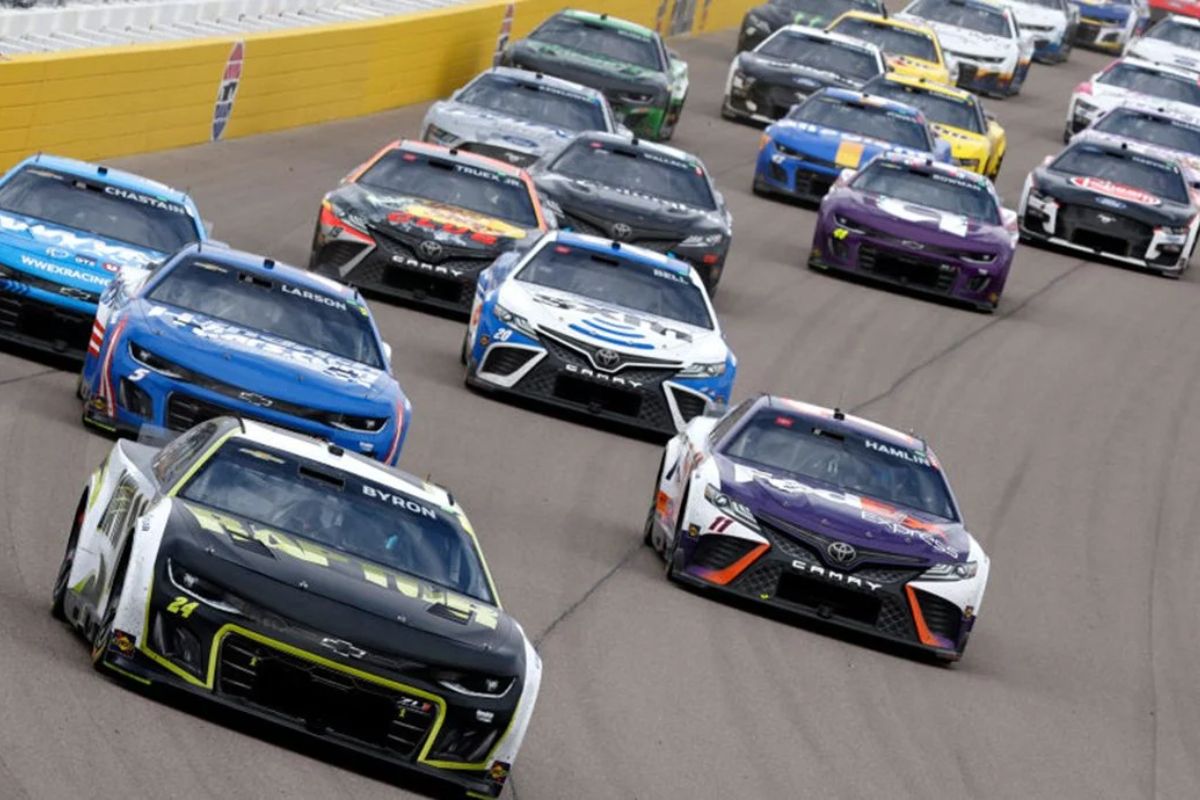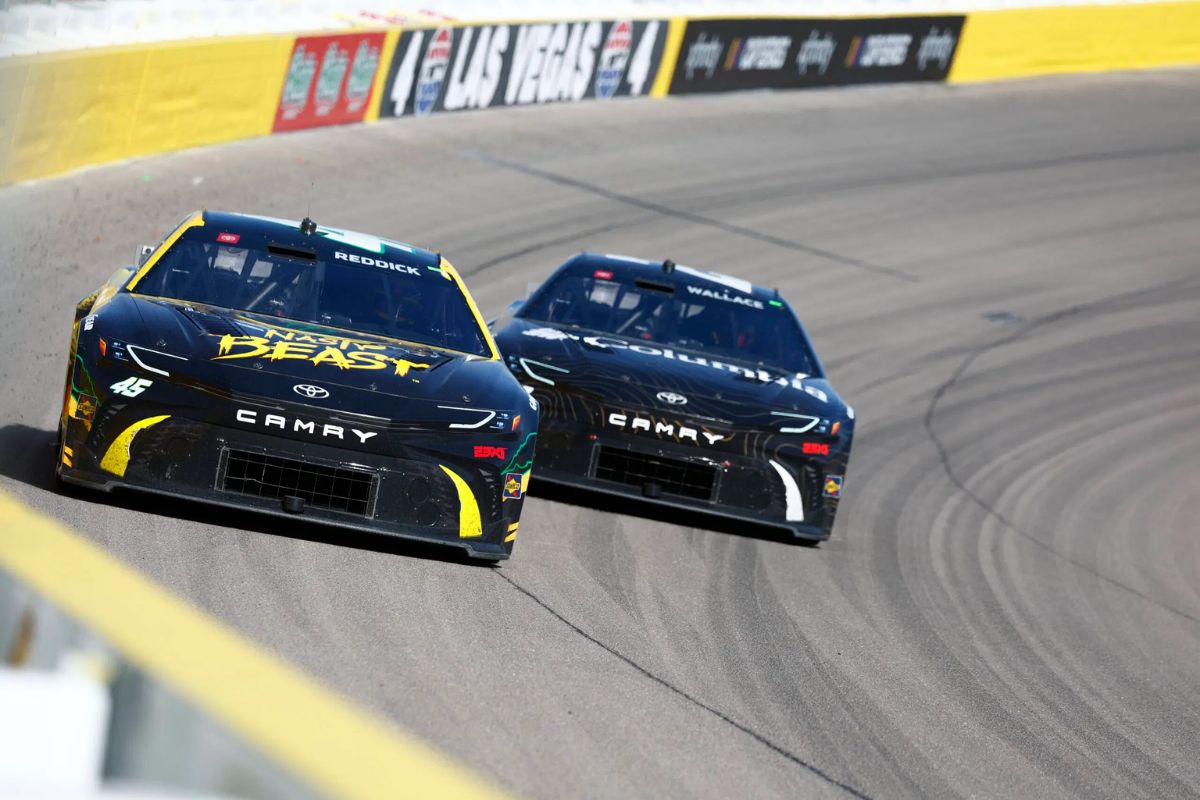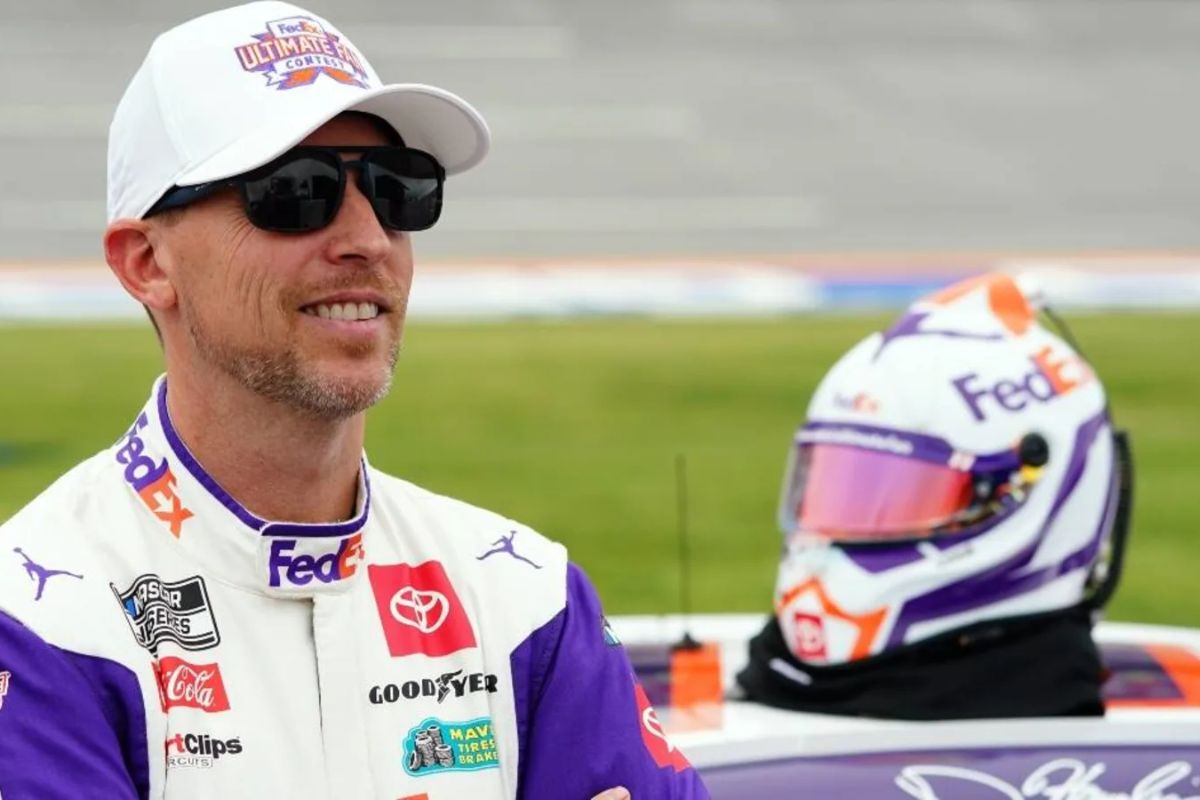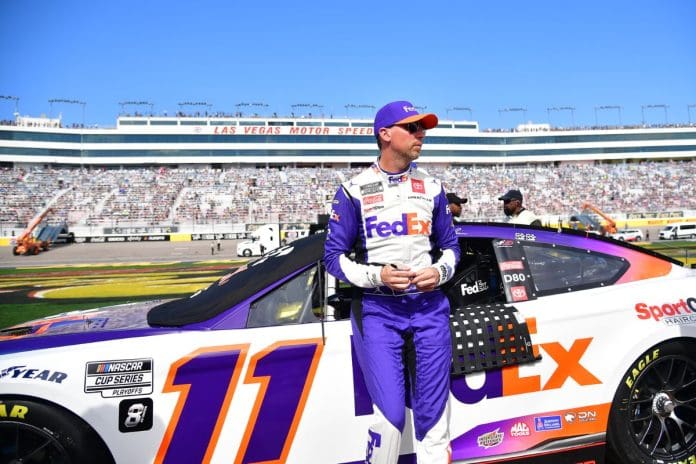Denny Hamlin Reveals NASCAR’s Greed: Denny Hamlin’s recent critique of NASCAR’s approach to charter negotiations reveals a complex web of financial and strategic interests that merit closer scrutiny. His pointed accusations of greed paint a picture of an organization possibly prioritizing monetary gain over the equitable treatment of its teams and drivers. This controversy is not just a matter of internal politics but strikes at the very core of NASCAR’s operational ethos and its future direction.
Key Takeaways
- Denny Hamlin criticizes NASCAR for prioritizing profits over teams’ financial security in charter negotiations.
- He highlights the disparity in financial benefits, warning of negative impacts on smaller teams.
- Hamlin argues for a fairer distribution of earnings from NASCAR’s lucrative new TV rights deal.
- He emphasizes the need for permanent charters to ensure long-term stability for all teams.
- Hamlin’s involvement signifies the seriousness of the issue and the urgency for equitable negotiations.
Behind-the-Scenes Drama in NASCAR
Amid ongoing charter renewal negotiations, a noticeable tension simmers behind the scenes in NASCAR, revealing a complex tableau of strategic planning and discontent among team owners. The current charter system, designed to provide stability and financial predictability, is at the heart of these negotiations. As the process drags on, team owners express mounting frustration over the pace and transparency of discussions, which they feel does not adequately address the evolving dynamics of the sport or the interests of its stakeholders.
The formation of the Team Negotiation Committee (TNC), including influential figures such as Michael Jordan, highlights the gravity of the situation. This initiative is not merely a reaction to slow progress but a strategic move to consolidate the bargaining power of the teams. It represents a shift towards a more unified front among team owners, aiming to influence the terms of charter renewal more effectively.

The Committee’s Objectives and Challenges
The objectives of the Team Negotiation Committee (TNC) are strategically focused on aligning the diverse interests of NASCAR’s stakeholders, yet they face significant challenges in navigating the individualistic approach favored by Jim France. The TNC’s principal aim is to foster a cohesive strategy that balances the needs and aspirations of all teams, enhancing collective bargaining power to guarantee equitable charter agreements. However, Jim France’s preference for one-on-one negotiations undermines this unity, creating a fragmented negotiation landscape. This approach not only diminishes the collective influence of the committee but also triggers variations among teams regarding access to information and negotiation advantage.
“To be quite honest, two of those stakeholders make nine-figure profits a year. And one stakeholder loses seven-figure profits per year. So, there’s clearly a disconnect.”
“We’re willing to give extra rights up to get that. They’ve said no. And then just governance, it’s certain protections that the teams need in case of transfer of ownership.”
“We’re dealing with you know certainly one individual that won’t come out publicly and tell his story of why he won’t give these things to the teams that have invested heavily uh in putting the show on each and every week.”-hamlin
The discrepancy in negotiation styles presents a critical challenge: it risks fostering a climate of mistrust and strategic misalignments among teams. This could potentially destabilize the organizational structure of NASCAR, leading to a competitive imbalance that could impact the sport’s integrity and fan perception. Additionally, the lack of a unified front complicates the TNC’s ability to present a consolidated set of demands or responses, giving NASCAR and its top executives like Jim France, a significant advantage in shaping outcomes to their favor without much resistance.
Team Owners’ Demands
Team owners have articulated a set of vital demands that aim to reshape their financial and operational landscape within NASCAR. These demands, driven by a desire for increased stability and influence, reflect a strategic pivot aimed at transforming the governance of the sport. Foremost among these is the call for improved financial support to maintain competitive operations. This is not merely about increasing profit margins; rather, it’s a fundamental factor in ensuring the sustainability and growth of the teams, which are foundational to the sport’s success.
The subsequent demand of the permanence of charters seeks to secure long-term stability for the teams. By making charters permanent, teams can better plan for the future, attract more substantial investments, and strengthen their operational frameworks without the looming uncertainty of charter renewal.
Furthermore, team owners are advocating for a significant role in NASCAR’s decision-making processes. This includes having a voice in operational decisions to proactively address potential costs and strategic misalignments that could arise from unilateral decisions made by the governing body.
Lastly, the demand for a share in profits from new business ventures represents a critical shift towards a more collaborative economic model where the teams’ contributions to the sport are economically recognized and rewarded. This would align the interests of NASCAR and its teams more closely, fostering a cooperative environment conducive to mutual growth and innovation.

Stalemate in Negotiations
Despite NASCAR’s profitable new TV rights deal, negotiations have hit an impasse over the duration of team charters, highlighting a significant difference in the long-term visions of the organization and its team owners. Jim France, the CEO, aligns the charter duration directly with the seven-year span of the new television agreement, suggesting a synergy between media rights and team stability. However, the teams, facing the volatility of the sport’s economics, seek to secure their financial futures by advocating for perpetual charters.
The core of this stalemate lies in the contrasting perspectives on financial security and operational flexibility. NASCAR appears to be leveraging its new TV deal as a stable foundation for short-to-medium term planning, likely aiming to preserve adaptability in governance and ownership structures as the sport evolves. On the other hand, team owners, grappling with the high costs of competition and the significant capital required to acquire a charter—sometimes as much as $40 million—are pushing for a more enduring solution to mitigate risk and safeguard a return on their hefty investments.
Warning of Serious Repercussions
As negotiations falter, Denny Hamlin voices a stark warning about the dire consequences for NASCAR teams if a favorable charter agreement is not reached soon. The current stalemate in negotiations, highlighted by Hamlin’s pointed remarks on Dale Earnhardt Jr’s podcast, reveals a critical imbalance in profit sharing among NASCAR’s stakeholders. With tracks and NASCAR itself reaping significant profits while teams face losses, the urgency for a fair charter system becomes apparent.
“It would be ignorant of fans to say, ‘Well that’s great, no charters.‘ Well, then we just wouldn’t show up when we don’t need to. The Clash, we won’t show up at that, the All-Star Race, we wouldn’t show up at that. Maybe there are some races that pay less, we just won’t show up to those, it’s just not financially good.”-hamlin
Hamlin’s discourse sheds light on the unequal distribution of financial benefits, emphasizing the plight of teams, particularly the smaller entities that have invested heavily in charters, sometimes to the tune of $40 million. His warning is not just a casual remark but a serious indication of potential disruptive actions by teams. For instance, teams might choose not to participate in less lucrative races, such as The Clash and the All-Star Race, or any event that fails to justify its financial outlay, threatening the overall integrity and appeal of the sport.

News in Brief
In the wake of Denny Hamlin’s disclosures, it is clear that NASCAR faces a crucial moment in its charter negotiations, highlighted by allegations of greed. The impasse presents significant risks not only to the financial stability of the teams but also to the sport’s general well-being. An fair resolution is imperative to safeguard the competitive integrity and sustainability of NASCAR. Therefore, stakeholders must prioritize a collaborative approach to resolve these issues, aligning interests to foster both immediate and long-term prosperity.
Our Reader’s Queries: Denny Hamlin Reveals NASCAR’s Greed
Q: Is Denny Hamlin a NASCAR driver?
A: Hamlin seems content with his NASCAR legacy, even if a championship remains elusive, acknowledging his stature as one of the sport’s greats.
Q: Why does Denny Hamlin not race for 23XI?
A: Hamlin shared his thoughts on potentially driving for 23XI Racing, suggesting it would require time to build a competitive team, emphasizing the crucial role of a strong pit crew.
Also Read: Denny Hamlin Supports Larson’s Indy Ambitions Over HMS


